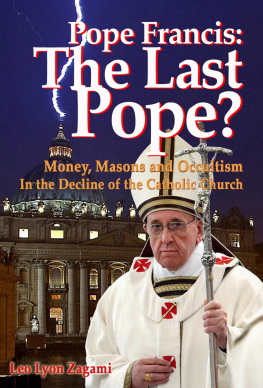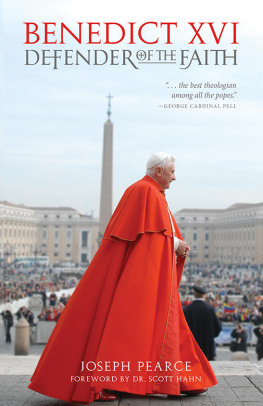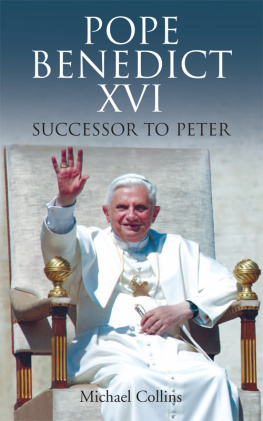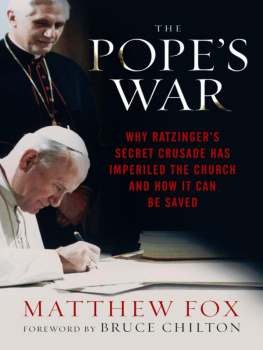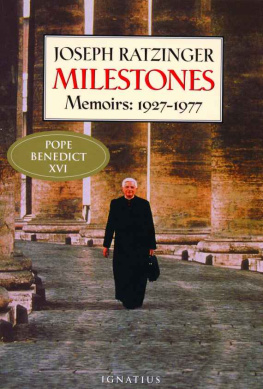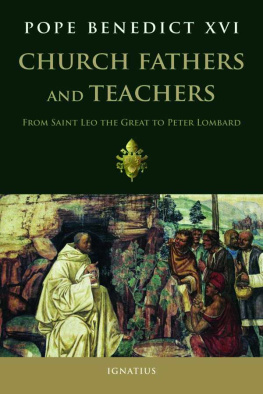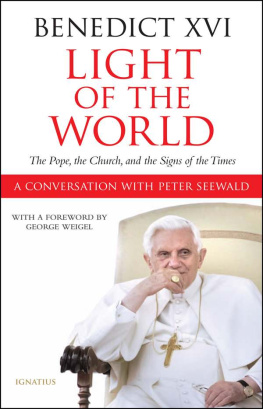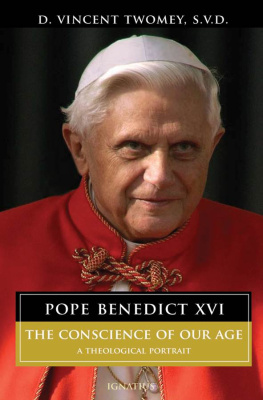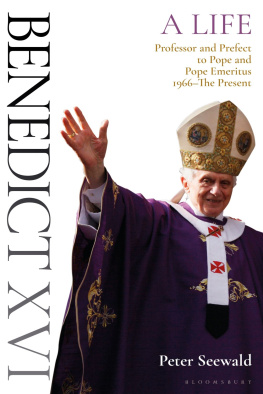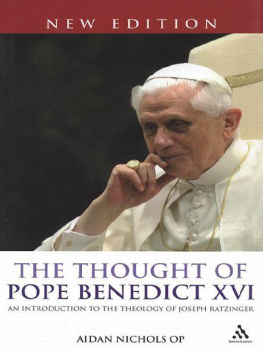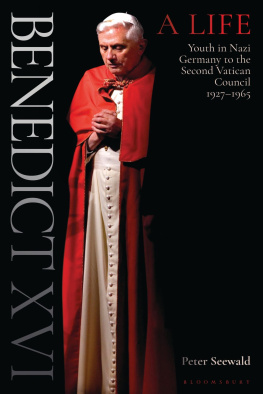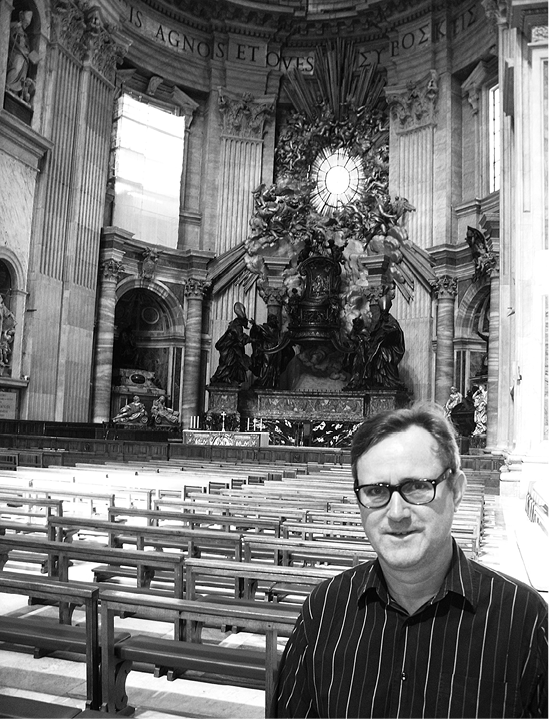Daniel Gawthrop is the author of four previous books, including The Rice Queen Diaries (Arsenal Pulp Press) and Affirmation: The AIDS Odyssey of Dr. Peter (New Star Books). A self-professed lapsed Catholic, he lives in Vancouver. Follow him on Twitter: @dgawthrop
For Rev. John Sproule
(In memoriam: Rev. Alan Alvare, Sr. Muriel Loftus)
There is nothing more difficult to take in hand, more perilous to conduct, or more uncertain in its success, than to take the lead in the introduction of a new order of things.
The first step toward finding God, Who is Truth, is to discover the truth about myself: and if I have been in error, this first step to truth is the discovery of my error.
On February 11, 2013, Pope Benedict XVI stunned the worldand, apparently, his own College of Cardinalsby announcing that he would resign the papacy and relinquish the throne of Saint Peter in seventeen days. Citing declining healthhe was known to be suffering from arthritis in the knees, hips, and ankles, thus experiencing mobility issues that would have made another papal tour too exhausting to contemplatethe pope added that he was failing in spirit and in mind. After having repeatedly examined my conscience before God, he told the hushed group of cardinals in the Sala del Concistoro of the Apostolic Palace, I have come to the certainty that my strengths, due to an advanced age, are no longer suited to an adequate exercise of the Petrine ministry.
This was not your average retirement announcement. The last pope to exercise his right to abdicate was Gregory XII, who stepped down in 1415 to end the western schism in the church. By becoming the first supreme pontiff to resign in nearly six hundred years, the man who became Pope Benedict XVI was making history. In doing so, he raised questions and ignited controversy, in a manner that had become his hallmark. Although it is quite plausible that Benedict, at nearly eighty-six years of age, wanted to avoid the sad spectacle of deteriorating into incoherence like his predecessor, the Parkinsons-wracked Pope John Paul II, those who knew him well did not believe for a minute that he was growing weak in mind. Joseph Aloisius Ratzinger had always done things his own way. He had always called the shots; always controlled the situation around him. And for all his brother Georgs insistence that he had made the decision months ago and was doing it for the good of the Church, failing health seemed to many like an odd reason to vacate a post, and a calling, that all but two of his predecessors had pledged to serve until their dying breath. As had he.
And so, speculation began immediately that he was bailing out for other reasons; that he was forced out of office by one of the many scandals engulfing the church and threatening to swallow it up. Was it clerical child sex abuse, which had cost the church billions in lawsuits from victims and become the subject of a complaint to the International Criminal Court, with fingers pointed at Benedict for his role in the cover-up? Was it the Vatican banking fiasco, which had scared off investors like JPMorgan Chase due to revelations of fraud, money laundering, and other tawdry practices, despite the popes best efforts to clean up Vatican finances? Was it the much-rumored power struggle with his secretary of state, Cardinal Tarcisio Bertone? Or was it fresh revelations of an underground gay priests network, revealed by an investigation Benedict himself had ordered, which confirmed that Roman Catholic officials were being blackmailed by Vatican outsiders?
Subsequent revelations in the respected Italian newspaper, La Repubblica, suggested that the latter scenario was the most likely: that on December 17, 2012, when Benedict finished reading a devastating report about sexual mischief and bad fish inside the Vatican, he decided that he had had enough. The nature and extent of the so-called gay priests network, the leaking of information, and the embarrassment to the church had reached a point beyond his ability either to cope with the problems or provide a solution as supreme pontiff. So, on that day he made a decision he would wait until February 11 to announce: that he was saving his beloved church by leaving its problems to a younger, and presumably worthier, pope. For a man who had dedicated his life to the pursuit of power and authority over all the churchs doings, it was the ultimate irony: Joseph Ratzinger, having finally assumed the throne of Saint Peter at age seventy-eight, was being forced to relinquish that power and authority as a result of events largely authored by himself.

When people ask why I wrote this book, I say its because Joseph Ratzinger destroyed the Roman Catholic Church. When they ask why that matters, I tell them that the church, for a brief moment in our lifetime, had a rare opportunity to heal itself and become both a powerful force for good in the world and a relevant player in civic discourse. That moment was the Second Vatican Council, or Vatican II: the gathering of church clerics and theologians between 1962 and 1965 that sought to reconcile the churchs mission with the realities of the modern world. Ratzinger, far beyond any other figure in the church, played a pivotal role in ensuring that the changes recommended by Vatican II would never come to pass. As a result, the church he helped create became a meaner placea place dedicated more to controlling peoples lives than to revealing the wisdom of the gospels. Rather than a force for good, it became the same divisive force of destruction it had been from the Middle Ages to the late nineteenth century. Vatican II thus represents a missed opportunity of historic proportions. Since its deliberations (and brief application by progressive clerics) had some impact in determining who I am today, I would like to share a bit of my own story before telling Ratzingers. The two are, however distantly, connected.

On April 11, 1963, Pope John XXIII released his final encyclical, Pacem in Terris (Peace on Earth). For the first time, a papal document was addressed not only to the Catholic faithful but to everyone of good will. Released only two years after the Berlin Walls erection and a few months after the Cuban missile crisis, Pacem in Terris was mindful of the global tensions caused by the Cold War. What was foremost in this popes mind, as he approached the end of his own life? That conflict should be resolved by negotiation and not war, that human rights were essential, and that every person, as the encyclical put it, has the right to life, to bodily integrity, and to the means which are suitable for the proper development of life
Half a century later, it is hard to imagine the spirit of communion, or the general atmosphere of the Second Vatican Council, that inspired Pacem in Terris. By communion, I am not referring to the eucharistic celebration but the communion of people in an egalitarian senseas opposed to the top-down, hierarchical Communio of blind and compulsory papalist loyalty that Joseph Ratzinger, Pope John Paul II, and their fellow conservative travelers would espouse from the end of the 1970s onward. Before Vatican II, the church was not a friendly place. It was the tower on the mountain, condemning everyone else, a retired cleric told me recently, the ship in which the faithful all gathered with Saint Peter while their enemies drowned in the sea.


